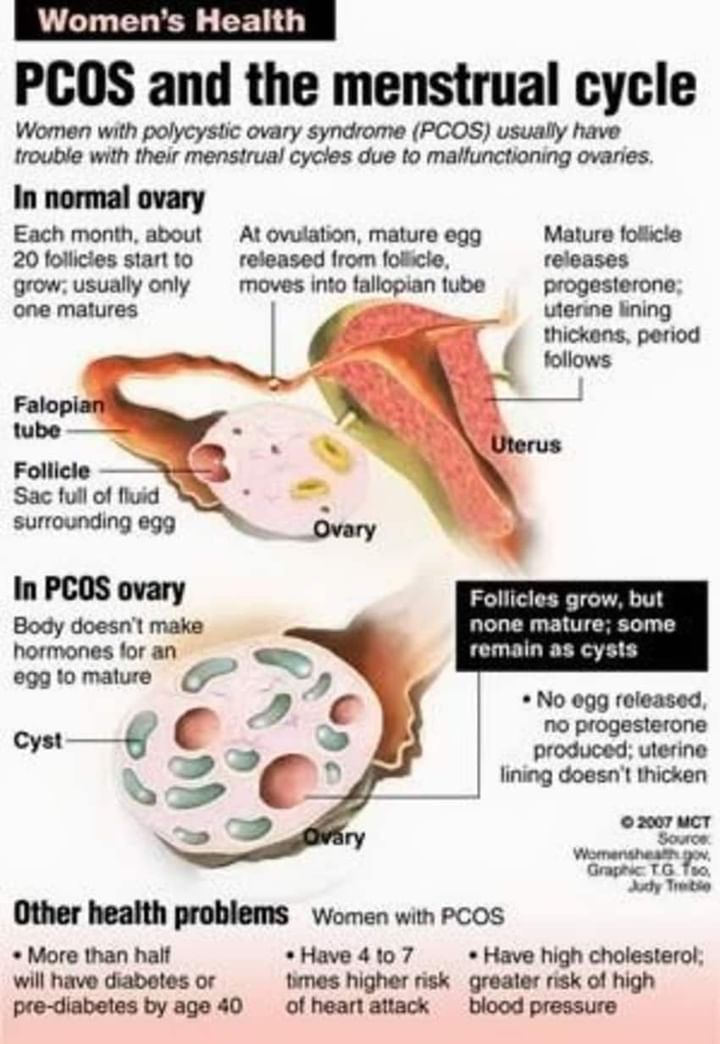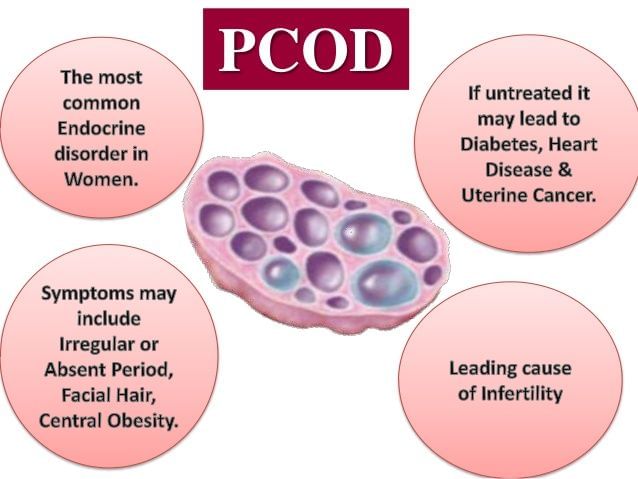Polycystic Ovarian Syndrome
Pcos
Polycystic ovarian syndrome, also known as pcos or stein-leventhal syndrome, is a “syndrome,” or group of symptoms that affects the ovaries and ovulation. Its three main features are:
Fluid filled sacs /cysts in the ovaries;
High levels of male hormones (androgen);
Irregular or skipped periods.
(doctors typically diagnose pcos in women who have at least two of these three symptoms)
In pcos, the ovarian cysts cause the levels of androgen to be raised more than the normal limits. Due to this overproduction, the ovarian follicles fail to mature.
Some women do not have cysts on their ovaries but other symptoms such as absence of ovulation or high levels of androgens where no other condition is known, may lead to a diagnosis of pcos.
Prevelence
It is a most common hormonal disorder (5% - 10%) in women during childbearing years (18 - 44).
Causes
Exact cause - not yet known. Factors that might play a role include:
Excess insulin: excess insulin might increase androgen production, causing difficulty with ovulation.
Low-grade inflammation: research has shown that women with pcos have a type of low-grade inflammation that stimulates polycystic ovaries to produce androgens, which can lead to heart and blood vessel problems.
Genetic predisposition: research suggests that certain genes might be linked to pcos. Means it tends to run in families.
Obesity or being overweight: means that if you are obese or overweight, your chances of developing pcos are higher than those with normal weight.
Excess androgen: the ovaries produce abnormally high levels of androgen, resulting in hirsutism and acne.
Symptoms
Signs and symptoms of pcos often develop around the time of the first menstrual period during puberty. Sometimes pcos develops later, for example, in response to substantial weight gain & signs and symptoms are typically more severe if you're obese.
Menstrual disorders: few, irregular or absent menstrual periods. Some women with pcos get fewer than 8 periods in a year; heavy bleeding as uterine lining builds up for a longer period of time, so the periods can be heavier than normal.
Ovarian cysts or cysts in the ovaries: enlargement of ovaries with small, multiple ovarian cysts which look like a string of pearls.
Weight management difficulties: including obesity/weight gain usually centered around the lower torso (apple shaped) and difficulty losing weight.
Fertility issues: lack of ovulation causing infertility. To get pregnant, you have to ovulate. Women who don’t ovulate regularly don’t release as many eggs to be fertilized. Pcos is one of the leading causes of infertility in women.
Signs of high levels of androgens & testosterone: extra hair growth on your face, chin, back, belly and chest (hirsutism), thinning of scalp hair, androgenic alopecia (male pattern baldness), acne associated with oily skin, skin discolorations (acanthosis nigricans, or dark patches/thick, hard skin)
Symptoms of premenstrual syndrome (pms): mood swings, bloating, etc.
Headaches: hormone changes can trigger headaches in some women.
Depression: both hormonal changes and symptoms like unwanted hair growth can negatively affect your emotions. Many with pcos end up experiencing depression and anxiety.
Decreased libido (sex drive).
Examinations & investigtions
There is no single test to diagnose pcos. To help diagnose pcos and rule out other causes of presenting symptoms, your doctor may talk to you about your medical history and do a physical exam and different tests:
Physical exam - blood pressure, body mass index (bmi), waist size, inspect skin for extra hair on face, chest or back, acne, or skin discoloration, any hair loss or signs of other health conditions (such as an enlarged thyroid gland).
Pelvic exam - for signs of extra male hormones (for example, an enlarged clitoris) and to see if your ovaries are enlarged or swollen.
Hormonal essay - androgen (increased) ; tsh, t3, t4 (abnormal); lh: fsh (greater than 3: 1); estradiol to estrone ratio (reversed); estrone level (markedly low); androstenedione (elevated); serum testosterone and dhea-s (elevated).
Usg - bilaterally polycystic ovaries are detected which is the main feature of pcos. Polycystic ovaries contain a large number of harmless follicles that are up to 8mm (approximately 0.3in) in size.
Blood sugar level (increased in some cases).
Complications
Some of the conditions that are likely to develop in untreated pcos, more so in obese patients are as follows-
Type 2 diabetes: a diabetic patient is always at risk of developing cardiac problems, chronic renal failure, hypertension, eye problems and so many other infections.
Metabolic syndrome: including central obesity, increased insulin levels or insulin resistance, high blood pressure, high blood sugar, and abnormal cholesterol or triglyceride levels that significantly increase your risk of cardiovascular disease.
Endometrial cancer: during ovulation, the uterine lining sheds. If you don’t ovulate every month, the lining can build up. A thickened uterine lining can increase your risk for endometrial cancer.
Pregnancy complications: twice risk of delivering baby prematurely; greater risk for miscarriage, gestational hypertention and gestational diabetes.
Non-alcoholic steatohepatitis/non-alcoholic fatty liver disease.
Autoimmune thyroiditis.
Sleep apnea: repeated pauses in breathing during the night, which interrupt sleep esp. Seen in overweight women.
General management
Not smoking, as this increases levels of androgens and the risk of heart disease.
Eat healthy.
For weight management: choose nutritious, high-fiber carbohydrates instead of sugary or refined carbohydrates; balance carbohydrates with protein and healthy fats; eat small meals and snacks throughout the day instead of large meals; exercise regularly to help manage insulin levels and your weight. Maintaining a healthy weight reduces androgen levels and reduce the risk of diseases such as diabetes and heart disease.
Medicinal management
Conventionally, in allopathy, menstrual symptoms have been treated with a low dose birth control pill. They have no medicines to completely cure or even reduce the size of the ovarian cysts. Ocp's are often prescribed which restore a normal hormone balance, regulate ovulation, relieve symptoms like excess hair growth, and protect against endometrial cancer but has a temporary effect of regularizing the menstrual cycle for as long as the medicines are taken. Once you leave the medication, you are back to irregular menses, this is because the cause is left untreated. In some cases, a surgery called laparoscopic ovarian drilling is considered. Other avenues include fertility treatments, or surgeries; oophorectomy, hysterectomy, or a cyst aspiration.
Homeopathy believes that the human body has been perfectly enabled by nature to keep itself disease free. It is only when the immunity or its own internal vitality is deranged that the body becomes incapable of keeping itself disease free. Therefore homeopathy tries to restore the balance of that vitality. Once the vitality regains its original balance, it is able to nurse itself back to health without any external aid.
Every woman with symptoms of pcos presents differently and so too each woman’s treatment plan will be. The weighting of pcos symptoms will vary and so the focus of treatment will too. Whether it is to help with hormonal imbalances or regulating periods, seeking relief from the side effects of prescribed medications or support in dealing with the stress and frustration associated with trying to get pregnant, or the emotional turmoil of being diagnosed with pcos or infertile, homeopathy can help restore health on both the physcial and emotional levels.
Goals of treatment:
Correct the hormone imbalance.
Lowering of insulin resistance levels.
Restoration of fertility.
Lower the level of testosterone (which will improve acne and lessen hair growth).
Restoration of regular menstruation, and prevention of endometrial hyperplasia and endometrial cancer.
Apis mellifica
Stinging pains in the ovarian region; accompanied by tenderness over abdomen and uterine region.
Unable to tolerate heat and feels worse in summers.
Right sided symptoms mostly.
Oedematous swellings of various body parts.
Calcarea carbonica
Pcos with prolonged, profuse periods.
Easy weight gain and obesity.
Excessive sweating on the head.
Extreme sensitivity to cold air.
Desire for sweets and boiled eggs and in a few cases, undigestible things like chalk and lime.
Graphites
Menses are too late and are pale and scanty.
Hardness may be felt in the ovarian region.
Tearing pain in the stomach region.
Constipation with other symptoms.
Patient is often of a stout build or is fat.
Cannot tolerate cold and is always feeling chilly.
Lachesis
Menses are too short and flow is feeble; or heavy periods or no periods at all.
Pains in the abdomen which are relieved after the flow starts.
Aversion or intolerance to anything being worn a little tight.
Most sypmtoms start from left side going to right.
Patients who talk a lot, jump from topic to topic.
Jealousy is another prominent symptom.
Circulation is deficient or excessive. Often cold hands and feet.
Pulsatilla
Menses are late or delayed and are scanty; suppressed for long duration.
Patient thirstless and takes little water.
Changeable moods.
Suited to young girls in whom the problem starts at puberty itself.
Difficulty digesting fatty foods.
Desire for cool open air; open air overall provides relief.
Mild, sensitive nature.
Tendency to weeping, weeps at the slightest instance and feels better when given consolation.
Sepia
Bearing down pains from the back and abdomen.
Feeling of “ball” like sensation in the inner parts.
Pelvic organs seem relaxed.
Menses are irregular. In some cases they are too late and scanty while in others they are early and profuse.
Vaginal dryness, vaginal tension or yeast infections. Yellowish or greenish leucorrhea.
Irritable and indifferent. Cares least even for her family members.
Abnormal hair growth on the face, especially on upper lips.
Ovaries remain enlarged with fluid-filled cysts in them.
Infertility.
Sensitivity to cold air.
Natrum muriaticum
Irregular and suppressed menstrual cycle.
Difficulty in conception.
Facial acnes or skin blemishes.
Repeat yeast infections.
Aversion to heat of sun.
Craving for extra salt in the diet.
Reserved nature; has weeping spells especially when alone and often worsening of symptoms when sympathy is offered.
Thuja occidentalis
Retarded menstrual flow with multiple cysts in ovaries.
Excessive hair growth on unusual parts including anywhere on the body, face, arms or legs.
Dissolves abnormal growth or accumulation anywhere in the body and can dissolve pcos cysts.
Cystic growths more pronounced in the left-side ovary.
Cysts may not cause much inflammation, but will be quite painful.




+1.svg)
